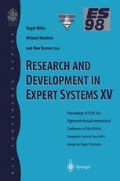Abstract
In this paper we describe a generic ontology to support N-dimensional spatial reasoning applications. The ontology is intended to support both quantitative and qualitative approaches and is expressed using set notation. Using the ontology; spatial domains of discourse, spatial objects and their attributes, and the relationships that can link spatial objects can be expressed in terms of sets, and sets of sets. The ontology has been developed through a series of application studies. For each study a directed application ontology was first developed which was then merged into the generic ontology. Application areas that have been investigated include: Geographic Information Systems (GIS), noise pollution monitoring, environmental impact assessment, shape fitting, timetabling and scheduling, and AI problems such as the N-queens problem.
Access this chapter
Tax calculation will be finalised at checkout
Purchases are for personal use only
Preview
Unable to display preview. Download preview PDF.
References
Beattie, B., Coenen, F.P., Hough, A., Bench-Capon, T.J.M., Diaz, B.M. and Shave, M.J.R. (1996). Spatial Reasoning for Environmental Impact Assessment. Third International Conference on GIS and Environmental Modeling, Santa Barbara: National Center for Geographic Information and Analysis, WWW and CD.
Brown, A.G.P., Coenen, F.P., Shave, M.J. and Knight, M.W. (1998). An AI Approach to Noise Prediction. To appear in Building Acoustics.
Coenen, F.P., Beattie, B., Bench-Capon, T.J.M., Shave, M.J.R. and Diaz, B.M. (1995). Spatial Reasoning for Timetabling: The TIMETABLER system. Proceedings of the 1st International Conference on the Practice and Theory of Automated Timetabling (ICPTAT’95), Napier University, Edinburgh, pp57–68.
Coenen, F.P., Beattie, B., Bench-Capon, T.J.M., Diaz, B.M. and Shave, M.J.R. (1996). Spatial Reasoning for Geographic Information Systems. Proceedings 1st International Conference on GeoComputation, School of Geography, University of Leeds, Vol 1, pp121–131.
Coenen, F.P., Beattie, B., Bench-Capon, T.J.M., Diaz, B.M. and Shave. M.J.R. (1997). A tesseral Approach to N-Dimensional Spatial Reasoning. In Hameurlain, A. and Tjoa, A.M. (Eds), Database and Expert Systems Applications, (Proceedings DEXA’97), Lecture Notes in Computer Science 1308, Springer Verlag, pp633–642.
Coenen, F.P., Beattie, B., Bench-Capon, T.J.M., Diaz, B.M. and Shave. M.J.R. (1998). Spatio-Temporal Reasoning Using A Multi-Dimensional Tesserai Representation. Proceedings ECAI’98, pp140–144.
Diaz, B.M. and Bell, S.B.M. (1987). Spatial Data Processing using Tesseral Methods. Natural Environment Research Council publication, Swindon, England.
Gruber, T. (1992). Ontolingua: A Mechanism to Support Portable Ontologies. Knowledge Systems Laboratory, Standford University, Stanford, USA.
Heijst, G. van (1995). The Role of Ontologies in Knowledge Engineering, Doctoral Thesis, University of Amsterdam, Amsterdam, The Netherlands.
Heijst, G. Van, and G. Schreiber (1994). CUE: Ontology-based knowledge acquisition, L. Steels, A. Th. Schreiber, and W. Van de Velde (eds.), A Future for Knowledge Acquisition, Proceedings of the 8th European Knowledge Acquisition Workshop EKAW’94, Vol. 867 of Lecture Notes in Artificial Intelligence, pp.178–199, Springer-Verlag, Berlin/Heidelberg, Germany.
Kuokka, D.R., J. McGuire, J.C. Weber, J.M. Tenenbaum, T.R. Gruber, and G.R. Olsen (1993). SHADE: Knowledge-Based Technology for the Re-Engineering Problem, Annual Report 1993.
Leher, N. (1990). Knowledge Representations Specification Language. Technical Report, DARPA/Rome Laboratory Planning and Scheduling Initiative, Reference manual.
Lenat, D.B. and R.V. Guha (1990). Building Large Knowledge-Based Systems; Representation and Reasoning in the Cyc Project, Addison-Wesley, Reading, Massachusetts, United States.
Morik, K., S. Wrobel, J-U. Kietz, and W. Emde (1993). Knowledge Acquisition and Machine Learning; Theory, Methods and Applications, Knowledge-Based Systems, Academic Press Limited, London, United Kingdom.
Sim, I., and G. Rennels (1995). Developing A Clinical Trial Ontology: Comments on Domain Modeling and Ontological Reuse, Knowledge Systems Laboratory Medical Computer Science, KSL-95-60, June 1995.
Simons, P. (1987). Parts — A study in Ontology. Clarendon Press, Oxford.
Visser, P.R.S. and T.J.M. Bench-Capon (1998). A Comparison of Four Ontologies for the Design of Legal Knowledge Systems, Artificial Intelligence and Law, Vol 6, No 1, pp3–26.
Wiederhold, G. (1994). Interoperation, Mediation, and Ontologies, Proceedings International Symposium on Fifth Generation Computer Systems (FGCS94), Workshop on Heterogeneous Cooperative Knowledge-Bases, Vol. W3, pp.33–48, ICOT, Tokyo, Japan.
Author information
Authors and Affiliations
Consortia
Editor information
Editors and Affiliations
Rights and permissions
Copyright information
© 1999 Springer-Verlag London Limited
About this paper
Cite this paper
Coenen, F., Visser, P., CORAL Research Group. (1999). A Generic Ontology for Spatial Reasoning. In: Miles, R., Moulton, M., Bramer, M. (eds) Research and Development in Expert Systems XV. Springer, London. https://doi.org/10.1007/978-1-4471-0835-1_4
Download citation
DOI: https://doi.org/10.1007/978-1-4471-0835-1_4
Publisher Name: Springer, London
Print ISBN: 978-1-85233-086-6
Online ISBN: 978-1-4471-0835-1
eBook Packages: Springer Book Archive

